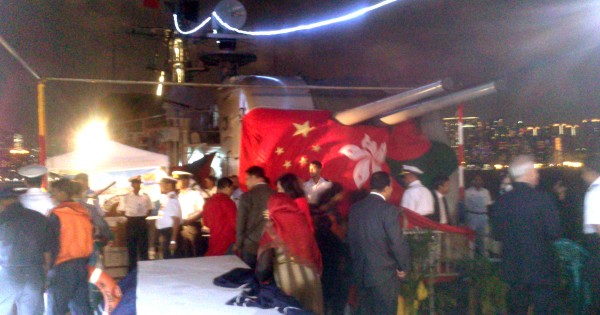The BNS Abu Bakr, a Bangladesh navy missile frigate, was in transit Hong Kong for a couple of day 13 April to 15 April 2014, on its way to Qingdao for the Western Pacific Naval Symposium (WPNS) and Multilateral Maritime Exercise (MMEx) held in this port city in China’s Shandong province.
In Hong Kong a friendly get-together and party was held on board the Abu Bakr, organised by the Consulate and the ship’s commodore, coincidently celebrating Bengali New Year with wide participation by the local Bangladesh community, plus invited friends from various local diplomatic institutions and the press. The ship’s band played throughout – the sailors proved very lively dancers in the joyful Bangladesh style.
In addresses, two senior officers bade the usual welcomes, in the very warm manner typical of the Bangladeshi, telling of the purpose of the trip – solidarity among the region’s maritime forces. They reminded everyone that training and exercises together with other nation’s fleets helps bring understanding and appreciation across borders, and that navel officers welcome such operations and they lead to safer waters and easing of potential conflict.
WPNS 2014 is a forum where Pacific Ocean region navies meet, biennially, to discuss co-operative initiatives to address regional and global maritime issues. Twenty ‘Pacific-Rim’ nations are presumed to take part. This is the first time China has hosted the event.
Though no mention was made of the absence of the Japanese navy in the exercises, despite an invite being extended by the Chinese, the speeches made it plain that co-operation between those two power would be beneficial to the whole region but of course it is understandable that there is some distance owing to the friction over the disputed islands in the local seas, plus, the issue of China’s East China Sea Air Defense Identification Zone (ADIZ). The symposium and the international fleet review are two separate matters.
The USA decided not to participate in the fleet review, ‘the Pentagon said that the US will attend the symposium, but will not participate in the review unless Japan can…’ Japan was not invited. This fleet review is merely a parade of the ships and their hardware but anyway, as it turns out, China has cancelled the multinational naval parade that was to mark the 65th anniversary of the PLA Navy. Reasons given were because of the continuing search for the missing Malaysia Airlines jet.
The Abu Bakr is intended for surface to surface duties in protection of the fleet and not so much anti-submarine. Bangladesh hardly has any enemy to concern itself about as its relations with neighbouring India is benign. As far as Myanmar is concerned, though troubles over events near their long border – and with the sad story of the Rohinga who get no sympathy from any side – are somewhat stressed, most duties of this vessel will likely be general coast guard ones – protection of off-shore installations, anti-smuggling, fisheries protection, disaster and relief operations.
Some details of the latter were shared following Commodore M. Khaled Iqbal’s talk on how the fleet, based in Chittagong, has been active in the search for the missing Malaysian aircraft with so many Chinese passengers on board and deep sympathy was expressed at the lives lost. The navy was pleased to be able to co-operate and at least ‘do their bit’.
It was notable that the consul general took a background role, Mr Mohammad Sarwar Mahmood, who was pivotal in the proceedings simply enjoyed being with his family and Bangladeshi compatriots letting the navy men have their day.
The just under 2,000 tons, twin-engine, 103 metre long, 11 metre broad frigate can move at up to 26 knots, though economic speed is around 18 knots. The crew of 200 includes 30 officers. Big guns fore (37mm) and aft (100mm), 8 missile launchers, and depth chargers at the bows it’s a capable vessel.
The Bangladesh navy has seen operations as far away from the home country as Lebanon, seconded under UN mandate.










